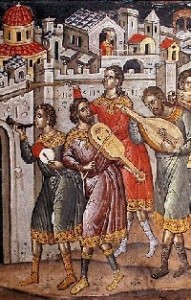What did Byzantine music sound like?
 Reader Spencer asks what Byzantine music sounded like and if there is any way to hear it today.
Reader Spencer asks what Byzantine music sounded like and if there is any way to hear it today.
Not too much is known about Byzantine secular music although given their fascination with the classical past, it was probably similar to that of ancient Greece and Rome. (Support for this theory is that the earliest Byzantine hymns still have the metrical schemes of ancient Greek poetry.) Music in the Hellenistic world had an important part in nearly every occasion and that continued in the Byzantine east. Singers- usually accompanied by stringed instruments and dancers- were found in most processions, celebrations, and even funerals. Stringed instruments were the most popular, although reed, wind, and percussion were also used. A 9th century Persian traveler who visited Constantinople reported that he was serenaded by dancers playing several types of harps and lyres. The water organ in particular attracted his attention- and apparently that of citizens generations before him. It shows up in several carvings, most prominently the base of Theodosius’ 4th century obelisk in the Hippodrome.
When it comes to sacred music, we’re on firmer ground. The first religious musicians originated in monastic communities around the time of Justinian, but unfortunately a musical writing system to record notes didn’t come to Constantinople till the 8th or 9th century. (We don’t know exactly what the early stuff sounded like, but most likely it was a plainsong or simple chant- to read a much more in-depth discussion of this go here: http://bit.ly/bKp3Tj)
Now for the good news. Byzantine music is surprisingly easy to find. Many of the notable figures of Byzantine history composed hymns or added to the liturgy- from St. John Chrysostom to Justinian and Leo the Wise- and they are still sung or chanted to this day. The best way to hear them is to attend your local Orthodox church, especially during one of the important liturgical days. If that’s not your cup of tea, then head on over to iTunes and do a search for ‘Cappella Romana’. They are a vocal group ‘specializing in Slavic and Byzantine repertories’.
Either way- by church or ipod- Byzantium will come alive as you’ve never experienced it before.